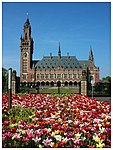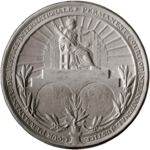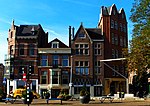Peace Palace

The Peace Palace (Dutch: Vredespaleis; pronounced [ˈvreːdəspaˌlɛis]) is an international law administrative building in The Hague, the Netherlands. It houses the International Court of Justice (which is the principal judicial body of the United Nations), the Permanent Court of Arbitration (PCA), The Hague Academy of International Law and the Peace Palace Library. The Palace officially opened on 28 August 1913; it was originally built to provide a home for the PCA, a court created to end war by the Hague Convention of 1899. Andrew Dickson White, whose efforts were instrumental in creating the court, secured from Scottish-American steel magnate Andrew Carnegie US$1.5 million ($50,000,000, adjusted for inflation) to build the Peace Palace. The European Heritage Label was awarded to the Peace Palace on 8 April 2014.
Excerpt from the Wikipedia article Peace Palace (License: CC BY-SA 3.0, Authors, Images).Peace Palace
Carnegieplein, The Hague Centrum
Geographical coordinates (GPS) Address Website External links Nearby Places Show on map
Geographical coordinates (GPS)
| Latitude | Longitude |
|---|---|
| N 52.0866 ° | E 4.2955 ° |
Address
Vredespaleis
Carnegieplein 2
2517 KJ The Hague, Centrum
South Holland, Netherlands
Open on Google Maps










